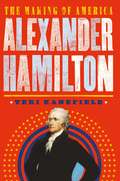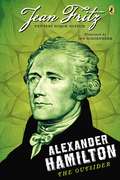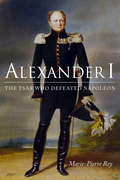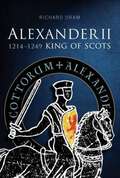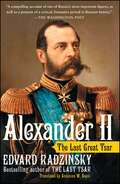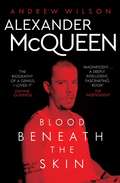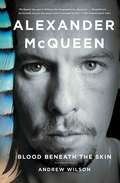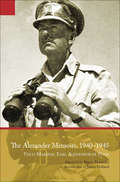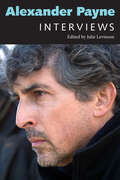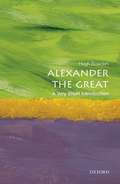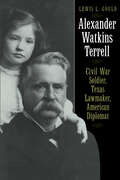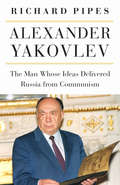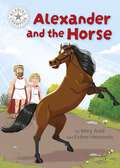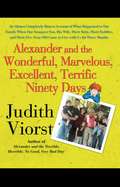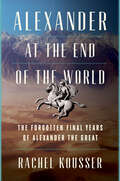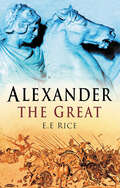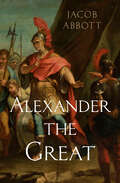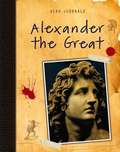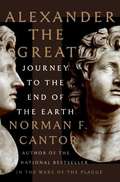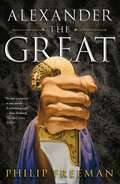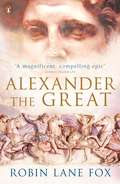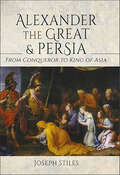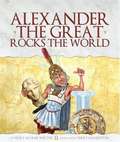- Table View
- List View
Alexander Hamilton: The Making Of America
by Teri KanefieldThe America that Alexander Hamilton knew was largely agricultural and built on slave labor. He envisioned something else: a multi-racial, urbanized, capitalistic America with a strong central government. He believed that such an America would be a land of opportunity for the poor and the newcomers. But Hamilton's vision put him at odds with his archrivals who envisioned a pastoral America of small towns, where governments were local, states would control their own destiny, and the federal government would remain small and weak. The disputes that arose during America's first decades continued through American history to our present day. Over time, because of the systems Hamilton set up and the ideas he left, his vision won out. Here is the story that epitomizes the American dream--a poor immigrant who made good in America. In the end, Hamilton rose from poverty through his intelligence and ability, and did more to shape our country than any of his contemporaries.
Alexander Hamilton: The Outsider
by Jean FritzAward-winning biographer Jean Fritz brings one of America's favorite Founding Fathers to life! Most people know that Alexander Hamilton was killed in a duel with Aaron Burr, and that his face is on the ten-dollar bill. But he was much more than that, and here acclaimed biographer Jean Fritz explores all facets of his life. Born in the West Indies, Hamilton arrived in New York as an outsider. He fought in the Revolution and became Washington's most valuable aide-de-camp. He was there for the writing of the Constitution and became the first Secretary of the Treasury. Fritz's talent for bringing historical figures to life shines as she shares her fascination with this man of action who was honorable, ambitious, and fiercely loyal to his adopted country. .
Alexander I: The Tsar Who Defeated Napoleon (NIU Series in Slavic, East European, and Eurasian Studies)
by Marie-Pierre ReyAlexander I was a ruler with high aspirations for the people of Russia. Cosseted as a young grand duke by Catherine the Great, he ascended to the throne in 1801 after the brutal assassination of his father. In this magisterial biography, Marie-Pierre Rey illuminates the complex forces that shaped Alexander's tumultuous reign and sheds brilliant new light on the handsome ruler known to his people as "the Sphinx." Despite an early and ambitious commitment to sweeping political reforms, Alexander saw his liberal aspirations overwhelmed by civil unrest in his own country and by costly confrontations with Napoleon, which culminated in the French invasion of Russia and the burning of Moscow in 1812. Eventually, Alexander turned back Napoleon's forces and entered Paris a victor two years later, but by then he had already grown weary of military glory. As the years passed, the tsar who defeated Napoleon would become increasingly preoccupied with his own spiritual salvation, an obsession that led him to pursue a rapprochement between the Orthodox and Roman churches. When in exile, Napoleon once remarked of his Russian rival: He could go far. If I die here, he will be my true heir in Europe. It was not to be. Napoleon died on Saint Helena and Alexander succumbed to typhus four years later at the age of forty-eight. But in this richly nuanced portrait, Rey breathes new life into the tsar who stood at the center of the political chessboard of early nineteenth-century Europe, a key figure at the heart of diplomacy, war, and international intrigue during that region's most tumultuous years.
Alexander II: King of Scots, 1214–1249 (The\northern World Ser. #No. 16)
by Richard OramAn account of the triumphs and tragedies, personal and political, of the controversial thirteenth-century Scottish king from the medieval historian and author. In equal measure state-builder, political unifier, ruthless opportunist, and bloody-handed aggressor, Alexander II has been praised or vilified by past historians but has rarely been viewed in the round. This book explores the king&’s successes and failures, presenting a fresh assessment of his contribution to the making of Scotland as a nation. It lifts the focus from an introspective national history to look at the man and his kingdom in wider British and European history, examining his international relationships and offering the first detailed analysis of the efforts to work out a lasting diplomatic solution to Anglo-Scottish conflict over his inherited claims to the northern counties of England. More than just a political narrative, the book also seeks to illuminate aspects of the king&’s character and his relationships with those around him, especially his mother, his first wife, Joan Plantagenet, and the great magnates, clerics, and officials who served in his household and administration. The book illustrates the processes by which the mosaic of petty principalities and rival power bases that covered the map of late twelfth-century Scotland had become by the mid-thirteenth century a unified state, hybrid in culture(s) and multilingual but acknowledging a common identity as Scots.
Alexander II: The Last Great Tsar
by Edvard RadzinskyAlexander II was Russia's Lincoln, and the greatest reformer tsar since Peter the Great. He was also one of the most contradictory, and fascinating, of history's supreme leaders. He freed the serfs, yet launched vicious wars. He engaged in the sexual exploits of a royal Don Juan, yet fell profoundly in love. He ruled during the "Russian Renaissance" of Dostoevsky, Tolstoy, and Turgenev -- yet his Russia became the birthplace of modern terrorism. His story could be that of one of Russia's greatest novels, yet it is true. It is also crucially important today. It is a tale that runs on parallel tracks. Alexander freed 23 million Russian slaves, reformed the justice system and the army, and very nearly became the father of Russia's first constitution and the man who led that nation into a new era of western-style liberalism. Yet it was during this feverish time that modern nihilism first arose. On the sidelines of Alexander's state dramas, a group of radical, disaffected young people first experimented with dynamite, and first began to use terrorism. Fueled by the writings of a few intellectuals and zealots, they built bombs, dug tunnels, and planned ambushes. They made no less than six unsuccessful attempts on Alexander's life. Finally, the parallel tracks joined, when a small cell of terrorists, living next door to Dostoevsky, built the fatal bomb that ended the life of the last great Tsar. It stopped Russian reform in its tracks. Edvard Radzinsky is justly famous as both a biographer and a dramatist, and he brings both skills to bear in this vivid, page-turning, rich portrait of one of the greatest of all Romanovs. Delving deep into the archives, he raises intriguing questions about the connections between Dostoevsky and the young terrorists, about the hidden romances of the Romanovs, and about the palace conspiracies that may have linked hard-line aristocrats with their nemesis, the young nihilists. Alexander's life proves the timeless lesson that in Russia, it is dangerous to start reforms, but even more dangerous to stop them. It also shows that the traps and dangers encountered in today's war on terrorists were there from the start.
Alexander McQueen
by Andrew WilsonWhen Alexander McQueen committed suicide in February 2010, aged just 40, a shocked world mourned the loss of its most visionary fashion designer. McQueen had risen from humble beginnings as the youngest child of an East London taxi driver to scale the heights of fame, fortune and glamour. He designed clothes for the world's most beautiful women including Kate Moss and Naomi Campbell. In business he created a multi-million pound luxury brand that became a favourite with both celebrities and royalty, most famously the Duchess of Cambridge who wore a McQueen dress on her wedding day. But behind the confident facade and bad-boy image, lay a sensitive soul who struggled to survive in the ruthless world of fashion. As the pressures of work intensified, so McQueen became increasingly dependent on the drugs that contributed to his tragic end. Meanwhile, in his private life, his failure to find lasting love with a string of boyfriends only added to his despair. And then there were the dark secrets that haunted his sleep... A modern-day fairy tale infused with the darkness of a Greek tragedy, this book will tell the sensational story of McQueen's rise from his hard East London upbringing to the hedonistic world of fashion. Those closest to the designer - his family, friends and lovers - have spoken for the first time about the man they knew, a fragmented and insecure individual, a lost boy who battled to gain entry into a world that ultimately destroyed him.
Alexander McQueen: Blood Beneath the Skin
by Andrew WilsonThe first, definitive biography of the iconic, notoriously private British fashion designer Alexander McQueen “offers new insights...and provides unprecedented access to a misunderstood soul” (The Boston Globe).When forty-year-old Alexander McQueen committed suicide in February 2010, a shocked world mourned the loss. McQueen had risen from humble beginnings as the son of an East London taxi driver to scale the heights of fame, fortune, and glamour. He created a multimillion-dollar luxury brand that became a favorite with celebrities, including Kate Moss and Naomi Campbell. He designed clothes for the world’s most beautiful women and royalty, most famously the Duchess of Cambridge, who wore a McQueen dress on her wedding day. But behind the confident facade and bad-boy image, lay a sensitive soul who struggled to survive in the ruthless world of fashion. As the pressures of work intensified, McQueen became increasingly dependent on the drugs that contributed to his tragic end. Meanwhile, his failure to find lasting love in a string of boyfriends only added to his despair. And then there were the secrets that haunted his sleep… A modern-day fairy tale infused with the darkness of a Greek tragedy, Alexander McQueen provides “a thorough and emotionally compelling exploration…of a complex and enigmatic artist” (Publishers Weekly). Andrew Wilson’s “magnificent” (The Independent, UK) and “compelling and heavily researched bio” (Entertainment Weekly), featuring never-before-seen photographs and rare interviews, dispels myths, corrects inaccuracies, and shares new insights into McQueen’s private life and the source of his creative genius.
Alexander Memoirs, 1940–1945
by Alexander of TunisAfter his first meeting with General Alexander in August 1942, Lieutenant-General Sir Brian Horrocks wrote that: By repute he was Winston Churchills fire brigade chief par excellence: the man who was always dispatched to retrieve the most desperate situations.Churchill was indeed in need of a fire brigade chief. Allied forces had been chased back across the desert by Rommel. Alexander bought a new hope to the Desert Rats: he instilled them with his own confidence and thought of victory. Under his command, Montgomery was ready to fight and win the battle of El Alamein. Even as his generals drove the enemy from North Africa, Alexander was planning far ahead for Sicily and Operation Husky: the first major seaborne invasion by either side during the war.It was said that before El Alamein the Allies never knew victory, and after El Alamein never knew defeat: much of the credit belongs to Alexander. For decades his contribution to the British efforts in both wars has been overlooked. Here, however, is a comprehensive edition of his personal and candid memoirs, which includes judgments on such men as Montgomery, Patton and Churchill. He also details his role in leading the withdrawal of the 1st Infantry Division at Dunkirk, his dealings with Stilwell in Burma and the bombing of the Monte Cassino abbey.
Alexander Payne: Interviews (Conversations with Filmmakers Series)
by Julie LevinsonSince 1996, Alexander Payne (b. 1961) has made seven feature films and a short segment of an omnibus movie. Although his body of work is quantitatively small, it is qualitatively impressive. His movies have garnered numerous accolades and awards, including two Academy Awards for Best Adapted Screenplay. As more than one interviewer in this volume points out, he maintains an impressive and unbroken winning streak. Payne's stories of human strivings and follies, alongside his mastery of the craft of filmmaking, mark him as a contemporary auteur of uncommon accomplishment. In this first compilation of his interviews, Payne reveals himself as a captivating conversationalist as well. The discussions collected here range from 1996, shortly after the release of his first film, Citizen Ruth, to the 2013 debut of his film, Nebraska. He also mentions the long process of bringing to fruition his most recent film, Downsizing. Over his career, he muses on many subjects including his own creative processes, his commitment to telling character-centered stories, and his abiding admiration for movies and directors from across decades of film history. Critics describe Payne as one of the few contemporary filmmakers who consistently manages to buck the current trend toward bombastic blockbusters. Like the 1970s director-driven cinema that he cherishes, his films are small-scale character studies that manage to maintain a delicate balance between sharp satire and genuine poignancy.
Alexander The Great: A Very Short Introduction
by Hugh BowdenAlexander the Great became king of Macedon in 336 BC, when he was only 20 years old, and died at the age of 32, twelve years later. During his reign he conquered the Achaemenid Persian Empire, the largest empire that had ever existed, leading his army from Greece to Pakistan, and from theLibyan desert to the steppes of Central Asia. His meteoric career, as leader of an alliance of Greek cities, Pharaoh of Egypt, and King of Persia, had a profound effect on the world he moved through. Even in his lifetime his achievements became legendary and in the centuries that followed his storywas told and retold throughout Europe and the East. Greek became the language of power in the Eastern Mediterranean and much of the Near East, as powerful Macedonian dynasts carved up Alexander's empire into kingdoms of their own, underlaying the flourishing Hellenistic civilization that emergedafter his death. But what do we really know about Alexander? In this Very Short Introduction, Hugh Bowden goes behind the usual historical accounts of Alexander's life and career. Instead, he focuses on the evidence from Alexander's own time - letters from officials in Afghanistan, Babylonian diaries, records fromEgyptian temples - to try and understand how Alexander appeared to those who encountered him. In doing so he also demonstrates the profound influence the legends of his life have had on our historical understanding and the controversy they continue to generate worldwide.
Alexander Watkins Terrell: Civil War Soldier, Texas Lawmaker, American Diplomat (Focus on American History Series)
by Lewis L. GouldAlexander Terrell's career placed him at the center of some of the most pivotal events in nineteenth- and early twentieth-century history, ranging from the Civil War to Emperor Maximilian's reign over Mexico and an Armenian genocide under the Ottoman Empire. Alexander Watkins Terrell at last provides the first complete biographical portrait of this complex figure. Born in Virginia in 1827, Terrell moved to Texas in 1852, rising to the rank of Confederate brigadier general when the Civil War erupted. Afterwards, he briefly served in Maximilian's army before returning to Texas, where he was elected to four terms in the state Senate and three terms in the House. President Grover Cleveland appointed him minister to the Ottoman Empire, dispatching him to Turkey and the Middle East for four years while the issues surrounding the existence of Christians in a Muslim empire stoked violent confrontations there. His other accomplishments included writing legislation that created the Texas Railroad Commission and what became the Permanent University Fund (the cornerstone of the University of Texas's multibillion-dollar endowment). In this balanced exploration of Terrell's life, Gould also examines Terrell's views on race, the impact of the charges of cowardice in the Civil War that dogged him, and his spiritual searching beyond the established religions of his time. In his rich and varied life, Alexander Watkins Terrell experienced aspects of nineteenth-century Texas and American history whose effects have continued down to the present day.
Alexander Wilson: The Scot Who Founded American Ornithology
by Edward H. Burtt William E. Davis Jr.Audubon was not the father of American ornithology. That honorific belongs to Alexander Wilson, whose encyclopedic American Ornithology established a distinctive approach that emphasized the observation of live birds. In the first full-length study to reproduce all of Wilson's unpublished drawings for the nine-volume Ornithology, Edward Burtt and William Davis illustrate Wilson's pioneering and, today, underappreciated achievement as the first ornithologist to describe the birds of the North American wilderness. Abandoning early ambitions to become a poet in the mold of his countryman Robert Burns, Wilson emigrated from Scotland to settle near Philadelphia, where the botanist William Bartram encouraged his proclivity for art and natural history. Wilson traveled 12,000 miles on foot, on horseback, in a rowboat, and by stage and ship, establishing a network of observers along the way. He wrote hundreds of accounts of indigenous birds, discovered many new species, and sketched the behavior and ecology of each species he encountered. Drawing on their expertise in both science and art, Burtt and Davis show how Wilson defied eighteenth-century conventions of biological illustration by striving for realistic depiction of birds in their native habitats. He drew them in poses meant to facilitate identification, making his work the model for modern field guides and an inspiration for Audubon, Spencer Fullerton Baird, and other naturalists who followed. On the bicentennial of his death, this beautifully illustrated volume is a fitting tribute to Alexander Wilson and his unique contributions to ornithology, ecology, and the study of animal behavior.
Alexander Yakovlev: The Man Whose Ideas Delivered Russia from Communism (NIU Series in Slavic, East European, and Eurasian Studies)
by Richard PipesA significant political figure in twentieth-century Russia, Alexander Yakovlev was the intellectual force behind the processes of perestroika (reconstruction) and glasnost (openness) that liberated the Soviet Union and Eastern Europe from Communist rule between 1989 and 1991. Yet, until now, not a single full-scale biography has been devoted to him. In his study of the unsung hero, Richard Pipes seeks to rectify this lacuna and give Yakovlev his historical due. Yakovlev's life provides a unique instance of a leading figure in the Soviet government who evolved from a dedicated Communist and Stalinist into an equally ardent foe of everything the Leninist-Stalinist regime stood for. He quit government service in 1991 and lived until 2005, becoming toward the end of his life a classical western liberal who shared none of the traditional Russian values. Pipes's illuminating study consists of two parts: a biography of Yakovlev and Pipes's translation of two important articles by Yakovlev. It will appeal to specialists and students of Soviet and post-Soviet studies, government officials involved with foreign policy, and general readers interested in the history of Russia and the Soviet Union.
Alexander and the Horse: Independent Reading White 10 (Reading Champion #517)
by Mary AuldThis story is part of Reading Champion, a series carefully linked to book bands to encourage independent reading skills, developed with Dr Sue Bodman and Glen Franklin of UCL Institute of Education (IOE) Fantastic, original stories are accompanied by engaging artwork and a reading activity. Each book has been carefully graded so that it can be matched to a child's reading ability, encouraging reading for pleasure. Perfect for 7-9-year-olds or those reading book band white.When Alexander the Great was just a boy, he met a horse that he longed to own. But the horse could not be ridden ...
Alexander and the Wonderful, Marvelous, Excellent, Terrific Ninety Days: An Almost Completely Honest Account of What Happened to Our Family When Our Youngest Son, His Wife, Their Baby, Their Toddler, and Their Five-Year-Old Came to Live with Us for Three Months
by Judith ViorstWhatever became of Alexander after that famously bad day? And did you know that Judith Viorst is his mother? And what happens to her passion for household neatness and orderliness, her deep devotion to schedules, her compulsive yearning to offer helpful advice when Alexander -- now grown up, married, and the father of three -- moves his family into his parents' house? What happens is controlled, and sometimes not so controlled, chaos, as lives and routines are turned upside down and the house is overrun with scattered toys, pacifiers, baby bottles, sippy cups, pink-sequined flip-flops, jigsaw puzzles, and fishy crackers. With her characteristic sparkle and wit, Viorst relates her efforts to (graciously) share space, to become (if only a little bit) more flexible, to (sort of) keep her opinions to herself, and even to eventually figure out how to unlock the safety locks of the baby's (expletives deleted) bouncy seat. She describes how she and her husband, while sometimes longing for the former peace and tranquillity of unravished rooms and quiet dinners for two unaccompanied by cries of "Oh, yuck!" survived and relished the extended visit of the Alexander Five. She also opens our eyes to the joys of multigenerational family living and to the unexpected opportunities to grow that life presents -- even under the most unlikely circumstances. Several generations of readers surely will relate to this funny and loving book, enhanced throughout by Laura Gibson's delightful two-color drawings.
Alexander at the End of the World: The Forgotten Final Years of Alexander the Great
by Rachel Kousser“A heart-pounding, mind-bending adventure.” —Ilyon WooA riveting biography of Alexander the Great’s final years, when the leader’s insatiable desire to conquer the world set him off on an exhilarating, harrowing journey that would define his legacy. By 330 B.C.E., Alexander the Great had reached the pinnacle of success. Or so it seemed. He had defeated the Persian ruler Darius III and seized the capital city of Persepolis. His exhausted and traumatized soldiers were ready to return home to Macedonia. Yet Alexander had other plans. He was determined to continue heading east to Afghanistan in search of his ultimate goal: to reach the end of the world. Alexander’s unrelenting desire to press on resulted in a perilous seven-year journey through the unknown eastern borderlands of the Persian empire that would test the great conqueror’s physical and mental limits. He faced challenges from the natural world, moving through deadly monsoons and extreme temperatures; from a rotating cast of well-matched adversaries, who conspired against him at every turn; and even from his own men, who questioned his motives and distrusted the very beliefs on which Alexander built his empire. This incredible sweep of time, culminating with his death in 323 BC at the age of 32, would come to determine Alexander’s legacy and shape the empire he left behind. In Alexander at the End of the World, renowned classicist and art history professor Rachel Kousser vividly brings to life Alexander’s labyrinthine, treacherous final years, weaving together a brilliant series of epic battles, stunning landscapes, and nearly insurmountable obstacles. Meticulously researched and grippingly written, Kousser’s narrative is an unforgettable tale of daring and adventure, an inspiring portrait of grit and ambition, and a powerful meditation on the ability to learn from failure.
Alexander of Macedon, 356-323 B.C.: A Historical Biography
by Peter GreenUntil recently, popular biographers and most scholars viewed Alexander the Great as a genius with a plan, a romantic figure pursuing his vision of a united world. His dream was at times characterized as a benevolent interest in the brotherhood of man, sometimes as a brute interest in the exercise of power. Green, a Cambridge-trained classicist who is also a novelist, portrays Alexander as both a complex personality and a single-minded general, a man capable of such diverse expediencies as patricide or the massacre of civilians. Green describes his Alexander as "not only the most brilliant (and ambitious) field commander in history, but also supremely indifferent to all those administrative excellences and idealistic yearnings foisted upon him by later generations, especially those who found the conqueror, tout court, a little hard upon their liberal sensibilities." This biography begins not with one of the universally known incidents of Alexander's life, but with an account of his father, Philip of Macedonia, whose many-territoried empire was the first on the continent of Europe to have an effectively centralized government and military. What Philip and Macedonia had to offer, Alexander made his own, but Philip and Macedonia also made Alexander form an important context for understanding Alexander himself. Yet his origins and training do not fully explain the man. After he was named hegemon of the Hellenic League, many philosophers came to congratulate Alexander, but one was conspicuous by his absence: Diogenes the Cynic, an ascetic who lived in a clay tub. Piqued and curious, Alexander himself visited the philosopher, who, when asked if there was anything Alexander could do for him, made the famous reply, "Don't stand between me and the sun." Alexander's courtiers jeered, but Alexander silenced them: "If I were not Alexander, I would be Diogenes." This remark was as unexpected in Alexander as it would be in a modern leader. For the general reader, the book, redolent with gritty details and fully aware of Alexander's darker side, offers a gripping tale of Alexander's career. Full backnotes, fourteen maps, and chronological and genealogical tables serve readers with more specialized interests.
Alexander the Great
by E E RiceKing Alexander III 'the Great' of Macedon was one of the greatest military commanders the world has ever known. This book seeks to dispel some of the myths which have grown up around him and to provide an up-to-date account of his life. This includes the Macedonian background and Alexander's early years, his campaigns in Thrace and Illyria and the destruction of Thebes, the invasion of the Persian Empire and the battles which led to its conquest, his expeditions to India and finally his death in Babylon. Dr Rice also assesses Alexander's personality, and provides a summary of his legacy to the western world.
Alexander the Great
by Jacob AbbottA complete biography of the ancient Macedonian king and one of history&’s greatest military leaders.Alexander the Great, son of King Philip II of Macedonia, and his fourth wife, Olympias, seemed destined for success. He had Aristotle for a tutor until he was sixteen. He took interest in his father&’s military efforts abroad, and worried there would be nothing left to conquer when he became king. When ambassadors from Persia arrived in Macedonia, they tried to entertain young Alexander with colorful stories of their home, but the future leader was more interested in their armies and war tactics. It should be no surprise that Alexander became one of ancient history&’s greatest and most successful military leaders.In this biography, author Jacob Abbott recounts the life and times of Alexander the Great. He takes readers through the king&’s early years, including his youth and education, as well as his relationship with his parents. The history continues with Alexander&’s ascension to the throne at the age of twenty and details all the drama and military victories over the next ten years of the monarch&’s reign as he expanded his empire from Macedonia and Egypt to northwest India. Unfortunately, Alexander&’s demise soon followed, but not before he left his mark on the world. Nineteenth-century American author Jacob Abbott wrote many books over the course of his own life from juvenile fiction to history. He wrote numerous biographies on such monumental individuals as Alfred the Great, Queen Elizabeth I, Genghis Khan, Julius Caesar, and Peter the Great.
Alexander the Great
by Nick HunterKnow all about ancient Greece, the rise of Alexander to power, his victories, failures and what happened after his death.
Alexander the Great
by Norman Cantor"Alexander's behavior was conditioned along certain lines -- heroism, courage, strength, superstition, bisexuality, intoxication, cruelty. He bestrode Europe and Asia like a supernatural figure." In this succinct portrait of Alexander the Great, distinguished scholar and historian Norman Cantor illuminates the personal life and military conquests of this most legendary of men. Cantor draws from the major writings of Alexander's contemporaries combined with the most recent psychological and cultural studies to show Alexander as he was -- a great figure in the ancient world whose puzzling personality greatly fueled his military accomplishments. He describes Alexander's ambiguous relationship with his father, Philip II of Macedon; his oedipal involvement with his mother, the Albanian princess Olympias; and his bisexuality. He traces Alexander's attempts to bridge the East and West, the Greek and Persian worlds, using Achilles, hero of the Trojan War, as his model. Finally, Cantor explores Alexander's view of himself in relation to the pagan gods of Greece and Egypt. More than a biography, Norman Cantor's Alexander the Great is a psychological rendering of a man of his time.
Alexander the Great
by Philip FreemanIn the first authoritative biography of Alexander the Great written for a general audience in a generation, classicist and historian Philip Freeman tells the remarkable life of the great conqueror. The celebrated Macedonian king has been one of the most enduring figures in history. He was a general of such skill and renown that for two thousand years other great leaders studied his strategy and tactics, from Hannibal to Napoleon, with countless more in between. He flashed across the sky of history like a comet, glowing brightly and burning out quickly: crowned at age nineteen, dead by thirty-two. He established the greatest empire of the ancient world; Greek coins and statues are found as far east as Afghanistan. Our interest in him has never faded. Alexander was born into the royal family of Macedonia, the kingdom that would soon rule over Greece. Tutored as a boy by Aristotle, Alexander had an inquisitive mind that would serve him well when he faced formidable obstacles during his military campaigns. Shortly after taking command of the army, he launched an invasion of the Persian empire, and continued his conquests as far south as the deserts of Egypt and as far east as the mountains of present-day Pakistan and the plains of India. Alexander spent nearly all his adult life away from his homeland, and he and his men helped spread the Greek language throughout western Asia, where it would become the lingua franca of the ancient world. Within a short time after Alexander&’s death in Baghdad, his empire began to fracture. Best known among his successors are the Ptolemies of Egypt, whose empire lasted until Cleopatra. In his lively and authoritative biography of Alexander, classical scholar and historian Philip Freeman describes Alexander&’s astonishing achievements and provides insight into the mercurial character of the great conqueror. Alexander could be petty and magnanimous, cruel and merciful, impulsive and farsighted. Above all, he was ferociously, intensely competitive and could not tolerate losing—which he rarely did. As Freeman explains, without Alexander, the influence of Greece on the ancient world would surely not have been as great as it was, even if his motivation was not to spread Greek culture for beneficial purposes but instead to unify his empire. Only a handful of people have influenced history as Alexander did, which is why he continues to fascinate us.
Alexander the Great
by Robin Lane FoxTough, resolute, fearless, Alexander was a born warrior and ruler of passionate ambition who understood the intense adventure of conquest and of the unknown. When he died in 323 BC aged thirty-two, his vast empire comprised more than two million square miles, spanning from Greece to India. His achievements were unparalleled - he had excelled as leader to his men, founded eighteen new cities and stamped the face of Greek culture on the ancient East. The myth he created is as potent today as it was in the ancient world. Robin Lane Fox's superb account searches through the mass of conflicting evidence and legend to focus on Alexander as a man of his own time. Combining historical scholarship and acute psychological insight, it brings this colossal figure vividly to life.
Alexander the Great & Persia: From Conqueror to King of Asia
by Joseph StilesUpon his return from India, Alexander the Great travelled to the Persian royal city of Pasargadae to pay homage at the tomb of King Cyrus, founder of the Achaemenid Persian Empire, whom he admired greatly. Disgusted to find Cyrus’ tomb desecrated and looted, the Macedonian king had the tomb guards tortured, the Persian provincial governor executed and the tomb refurbished. This episode involving Cyrus’ tomb serves as one of many case studies in Alexander’s relationship with Persia. At times Alexander would behave pragmatically, sparing his defeated enemies and adopting Persian customs. Sisygambis, the mother of Persian King Darius III, allegedly came to view Alexander as a son and starved herself at the news of his demise. On other occasions he did not shy away from destruction (famously torching the palace at Persepolis) and cruelty, earning himself the nickname ‘the accursed’. This conflicting nature gives Alexander a complex legacy in the Persian world. Joseph Stiles explores Alexander the Great’s fascinating relationship with his ‘spear-won’ empire, disentangling the motives and influences behind his policies and actions as ‘King of Asia’.
Alexander the Great Rocks the World
by Vicky Alvear ShecterSixteen-year-old Alexander was left in charge of Macedon when his father, the king, went on a business trip. When a barbarian tribe attacked Macedon, Alexander led the army against them, and won! By 18, Alexander was named a general of the army; at 20 he ruled all of Ancient Greece; at 25 he had conquered most of ancient Persia. By 32, he was really King of the World!
